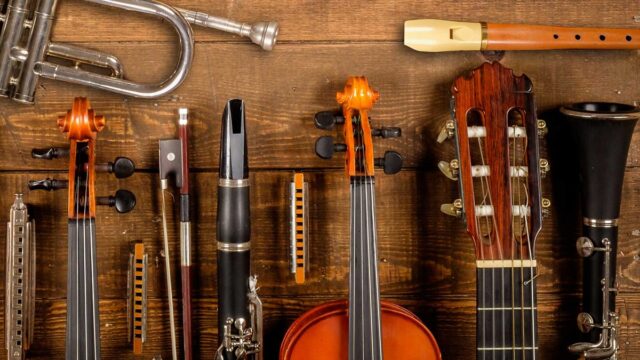Playing a musical instrument makes you creative, smarter, and happier. Some musical instruments are easier to learn than others.
Some instruments require a higher level of physical dexterity, cognitive processing, or emotional engagement than others. It makes them challenging for beginners. Before starting to learn a musical instrument, you should know what factors are affecting learning an instrument.
Factors Affecting Learning an Instrument

Learning a musical instrument is both difficult and rewarding, and some circumstances might influence how easy it is to learn. These factors are broadly categorized into physical, cognitive, and emotional factors.
Physical Factors
- Size and shape of the instrument: A learner’s ability to play an instrument is affected by its size and shape. Instruments such as the double bass or cello, for example, require greater physical room and muscle to play than smaller instruments such as the flute or clarinet.
- Finger and hand size: The size of one’s fingers and hands can also impact learning an instrument. For example, playing the guitar or piano requires a certain level of finger dexterity and flexibility to reach certain notes and chords.
- Breath capacity (for wind instruments): Wind instruments like the trumpet, saxophone, or flute require breath control and lung capacity, making them physically demanding to play.
Cognitive Factors
- The complexity of the instrument: The complexity of an instrument can impact the ease of learning it. Some instruments are more difficult to learn. The violin or harp, for instance, have intricate fingerings that require more attention to detail than simpler instruments like the ukulele or harmonica.
- Sight-reading skills: Sight-reading is the ability to read and play music notation in real time. Instruments like the piano or violin require a high level of sight-reading skills to play, making them more challenging to learn for beginners.
- Coordination skills: Coordination skills are crucial when playing musical instruments. For example, drumming requires hand and foot coordination. While playing the piano requires coordination between the left and right hands.
Emotional Factors
- Motivation and passion: Learning a musical instrument requires motivation and passion to keep practicing and improving. Without these emotional factors, learners may struggle to stay committed to the process of learning.
- Prior musical experience: Prior musical experience can make learning an instrument easier, as learners already have some knowledge and skills that can be transferred to the new instrument.
- Cultural background and exposure: Cultural background and exposure can influence the ease of learning an instrument. For example, growing up in a musical family or community can make learning certain instruments, like the violin or guitar, easier due to exposure and cultural familiarity.
Comparison of Instruments

Learning music and an instrument is a fulfilling experience, and different instruments offer unique challenges and benefits. We will compare the piano, guitar, and violin.
Piano

Explanation of the physical, cognitive, and emotional factors affecting learning: The piano requires a high level of finger dexterity, coordination, and sight-reading skills. Learners must have the physical ability to reach all the keys and maintain a good posture while playing.
The cognitive demands of the piano include understanding music theory, interpreting complex rhythms, and memorizing pieces. Emotionally, playing the piano can be satisfying and meditative, but also requires discipline and perseverance.
Learning the piano is versatile in playing different styles of music. It can also serve as a foundation for learning other instruments. The piano is costly to buy and maintain, and its size can be a problem for some learners who lack adequate space at home.
Guitar

Explanation of the physical, cognitive, and emotional factors affecting learning: The guitar requires finger dexterity, coordination between the left and right hand, and strumming skills.
Learners must develop calluses on their fingertips to play comfortably. The cognitive demands of the guitar include understanding chord progressions, tablature, and scales. Emotionally, playing the guitar is a social activity.
Learning the guitar is affordable, portable, and popular in various music genres. However, reading sheet music can be challenging, and developing a good tone may take longer.
Violin

Explanation of the physical, cognitive, and emotional factors affecting learning: The violin requires a high level of finger dexterity, coordination between the left and right hand, and bowing skills. Learners must maintain a good posture and hand position to produce a good sound.
The cognitive demands of the violin include understanding music theory, reading sheet music, and memorizing pieces. Emotionally, playing the violin can be a highly expressive and emotional experience.
One of the benefits of mastering the violin is its adaptability in performing a variety of musical styles, from classical to folk. It can also be a highly rewarding instrument to master. However, the violin is physically demanding and challenging to learn. Especially for beginners who struggle to produce a good sound. It can also be an expensive instrument to purchase and maintain.
Tips for Choosing an Instrument to Learn

Choosing a musical instrument to learn can be an exciting but daunting task. It is essential to consider various factors before making a decision. Here are some tips to help you choose the right instrument to learn.
Assessing Physical, Cognitive, and Emotional Factors
Consider your physical abilities, such as hand size and breath capacity for wind instruments. Some instruments may require more physical strength or coordination than others.
Assess your cognitive skills, including your ability to read sheet music and understand music theory. Also, consider your emotional preferences and goals, such as whether you want to play solo or in a group, or whether you prefer a highly expressive instrument or one that is more technical.
Identifying Personal Preferences and Goals
Think about the type of music you enjoy playing and listening to. Because some instruments are better suited to specific musical genres, it is critical to consider your musical preferences when selecting an instrument.
Also, think about your goals for learning the instrument, such as whether you want to play for personal enjoyment or aspire to perform professionally.
Seeking Advice From Music Teachers and Experienced Musicians
It can be helpful to consult with music teachers and experienced musicians to get their recommendations and insights on different instruments. They teach about the difficulty level of different instruments and the types of skills required to play them. They can also help you assess your physical, cognitive, and emotional abilities and identify instruments that may be suitable for you.
Ultimately, with discipline, perseverance, and the right resources, anyone can learn and master a musical instrument.




